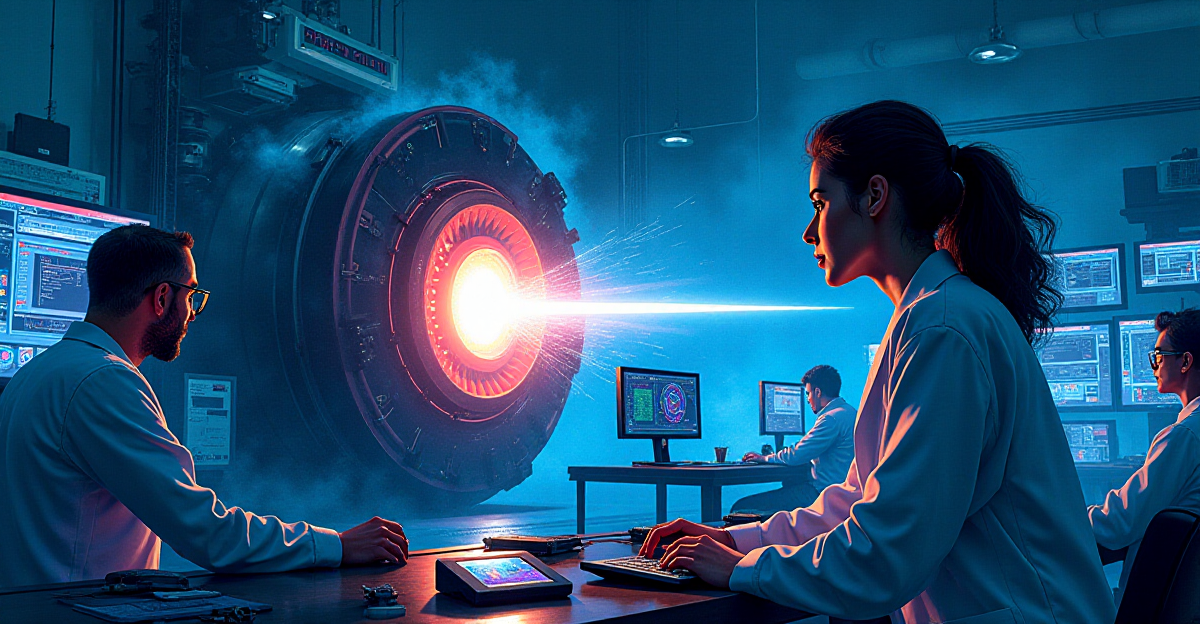Theoretically, magnetic monopoles are particles with only one magnetic pole—north or south—that, should be found, would transform physics. The search for these particles—which have been proposed but never definitively seen—is investigated in this article. My discussion with a physicist building the Large Hadron Collider helped me to understand the thrill and uncertainty surrounding this pursuit. We will examine the consequences of their existence for quantum mechanics and cosmology, present studies intended to detect them, and the reasons their finding would be a turning point in physics. This story weaves the excitement of the hunt with thorough scientific investigation.
Table of Contents
- The Fascinating Idea of Magnetic Monopoles
- The Hunt for Magnetic Monopoles
- The Theoretical Impact if Magnetic Monopoles Are Found
- Extra’s:
The Fascinating Idea of Magnetic Monopoles

Ever found yourself wondering why a magnet works? Magnets have two poles—a north pole and a south pole, you know. What would happen, though, if particles possessed just one magnetic pole? The amazing idea of magnetic monopoles – particles that might exist and completely change our perspective on magnetism.
Imagine a universe in which single magnetic pole particles abound. Unlike the magnets we know from daily life, which always have both, these particles would behave as solo magnets with just a north or south pole. Particularly theoretical physics and particle physics, these speculative particles could transform our knowledge of fundamental forces in nature.
The Quest for Monopoles
Scientists have had an interesting and protracted trip in quest of magnetic monopoles. First signs of their existence surfaced in the 19th century thanks to the work of scientist Pierre Curie. Curie noted magnetic poles and electric charges had an imbalance. Though magnetic poles always show in pairs, electric charges can exist as individual particles. Curie so started to wonder whether this asymmetry reflected our limited knowledge or if it was a basic law of nature.
Using a variety of tests and techniques, physicists are still unrelentingly seeking magnetic monopoles today. One fascinating experiment entails the most potent particle accelerator in the world, the Large Hadron Collider. Superhigh energies produced by this collider could produce magnetic monopoles in particle collisions. The theory that such strong collisions could at last expose these elusive particles drives this investigation.
Still another intriguing method is the “Monopole Search with a Superconducting Quantum Interference Device (SQUID).” This experiment detects magnetic monopoles perhaps going through the Earth using a superconducting gadget, remarkably sensitive to magnetic fields.
Diving Deeper into Quantum Theory
One can understand the intriguing idea of magnetic monopoles by means of quantum physics ideas. Quantum theory, claims magnetic monopole, a particle with a single, quantized magnetic charge. The occurrence of magnetic monopoles could have major ramifications for quantum physics. Two basic forces of nature, electromagnetism and weak nuclear force, could be united under their help as well as offer understanding of the Grand Unified Theory, which seeks to unite all fundamental forces into one framework.
In physics, the identification of magnetic monopoles would be a historic occasion possibly transforming our knowledge of the forces controlling our planet. What if these particles reveal the secrets of the world or perhaps the basic character of magnetism itself?
You may be thinking, in our daily life, how can we use our knowledge of magnetic monopoles? The solution then resides in quantum physics and its possible uses. New kinds of magnetic materials with special qualities could be developed using magnetic monopoles, therefore advancing sectors including data storage and energy generation.
The path itself is evidence of the infinite interest and inventiveness of the scientific community even while the hunt for these elusive particles keeps on. Though magnetic monopoles nevertheless enthrall our imagination and inspire us to investigate the great secrets of the cosmos, we cannot see them with our unaided eyes.
The Hunt for Magnetic Monopoles

Why do magnets always have two poles—a north and a south? Have you ever wondered? Opposing poles attract, and like poles repel as we know. What would happen, though, if particles only possessed one pole? These are magnetic monopoles, speculative particles expected by quantum theory and theoretical particles that might alter our understanding of magnetism. Imagine a particle entirely unlike anything we have ever seen—a solitary, isolated north or south pole.
Why the Search for Magnetic Monopoles Matters
For our conception of the basic forces of nature, including magnetism, discovering magnetic monopoles would be quite significant. It might transform medical imaging as well as energy generation. For decades scientists have been looking for these elusive particles.
Hunting for Magnetic Monopoles
Looking for magnetic monopoles is particularly fascinating at particle accelerators like the Large Hadron Collider. With amazing speed, this strong machine smashes particles together to generate circumstances akin to the Big Bang. In search of evidence of magnetic monopoles generated in the turmoil, scientists examine the trash from these collisions.
SQUIDs provide still another approach to hunt for magnetic monopoles. These tools are quite magnetic field sensitive. Scientists think SQUIDs could detect a rapid shift in the magnetic field produced if a magnetic monopole passed through the Earth.
The Search Continues
See yourself as a scientist laboring late at night over experimentally generated data. You are searching for a certain trend, anything that can at last establish the presence of magnetic monopoles. This is the excitement of this path, a trip into the future! The search goes on even though there is currently no solid proof.
Consider the ramifications upon discovery of magnetic monopoles. It might redefine magnetism and the basic forces of nature. It could result in hitherto unimaginable new technologies right here now. This is an exciting search for the unknown that might possibly transform the planet.
The Theoretical Impact if Magnetic Monopoles Are Found

Ever wonder what the world might be like if magnetism operated differently? What if there were particles with just one magnetic pole instead of always two poles—north and south? For decades, these speculative particles known as magnetic monopoles, have enthralled researchers. Though they haven’t yet been found, their possible consequences are amazing.
Imagine a time when we at last identify these mysterious particles, therefore transforming particle physics and our knowledge of magnetism. How might our knowledge of the cosmos change? How might our life differ?
How Magnetic Monopoles Could Change Our Understanding of Physics
In physics, discovering magnetic monopoles would be very significant. We would have to rewrite some of the most fundamental rules of the cosmos, therefore challenging all we know about magnetism.
Imagine a universe in which magnetism and electricity and a force acting inside atoms weren’t different forces. The missing link linking these two forces could be magnetic monopoles, therefore offering a more whole picture of the forces controlling all around us. Imagine being able to use a single, uniting theory—a Grand Unified Theory—that integrates all four fundamental forces—to explain the basic dynamics of the universe!
Magnetic monopoles might entirely rethink quantum theory. This field of physics addresses the immensely tiny universe of atoms and particles. According to present knowledge of quantum theory, moving electric charges generate magnetic fields. Magnetic monopoles would violate that criterion, though, and challenge our conception of magnetism from the bottom up.
The Potential Technological Impact of Magnetic Monopoles
Finding magnetic monopoles would transform our planet as well as our perspective of the cosmos. Consider some of the possibilities:
Imagine carrying all the music ever produced on a thumb drive-sized device, or even smaller, revolutionizing data storage! Consider the volumes of data our computers, cellphones, and other gadgets store. With magnetic monopoles, we could design far smaller storage devices with considerably more capacity.
Unlocking New Possibilities in Energy: More strong and efficient magnets made possible by these particles might transform energy generation and storage. Imagine a time when we might run our cars and houses with magnetic, clean energy! We could potentially create quite powerful electric motors using them, transforming transportation. Picture faster, more efficient electric cars with a greater range!
Development of new medical imaging technologies with higher accuracy and resolution could be accomplished using magnetic monopoles. Early and more exact diagnosis of diseases made possible by these technologies could improve treatment results by helping us With more accurate scans, imagine being able to spot early indicators of cancer or other disorders, therefore enabling speedier treatment and improved likelihood of recovery.
Search for magnetic monopoles keeps on. Strong particle accelerators are being used by scientists to attempt to produce these particles in under control settings. The possible influence of these particles is really amazing; it’s a fantastic trip of scientific exploration!
What if unlocking a new age of technology depends on these enigmatic particles? Though the hunt for magnetic monopoles never stops, their possible influence is both fascinating and motivating. It reminds us of the ability of scientific inquiry and curiosity to stretch our knowledge and solve cosmic riddles.
Extra’s:
For a deeper dive into the fascinating world of magnetism, you can explore the concept of “Superconductivity: The Path to Zero Resistance,” which delves into materials that conduct electricity with zero resistance. This phenomenon is closely related to the magnetic field behavior, and understanding it can provide valuable insights into the intricacies of magnetic monopoles. You might also be interested in “Time Dilation: A Journey Through Einstein’s Relativity,” which explores the warping of spacetime and its implications for the fundamental forces of nature, including magnetism.
If you are interested in exploring the latest research on magnetic monopoles, “Hunting for magnetic monopoles with the Universe’s strongest magnetic fields | ATLAS Experiment at CERN” provides a comprehensive overview of the ongoing search for these elusive particles using the powerful magnetic fields generated by the Large Hadron Collider. For a deeper understanding of the potential implications of magnetic monopoles on the universe, “Cosmological and Astrophysical Implications of Magnetic Monopoles | SpringerLink” explores their potential role in shaping the cosmic landscape and influencing the evolution of stars and galaxies.












1 thought on “In Search of the Elusive Magnetic Monopoles”